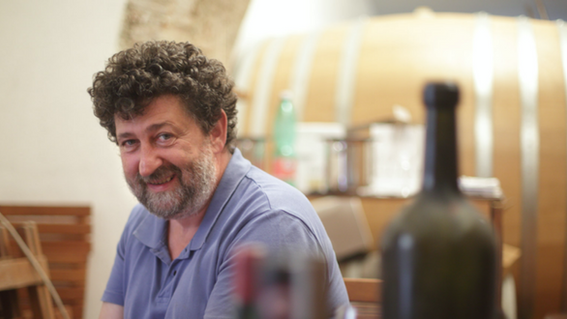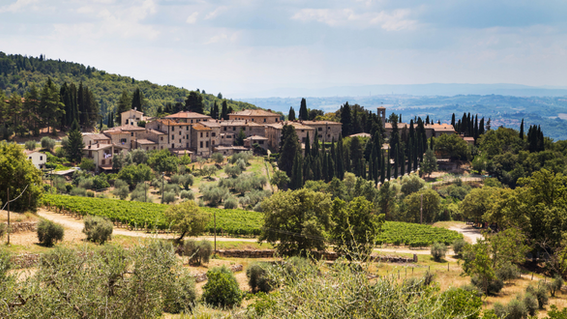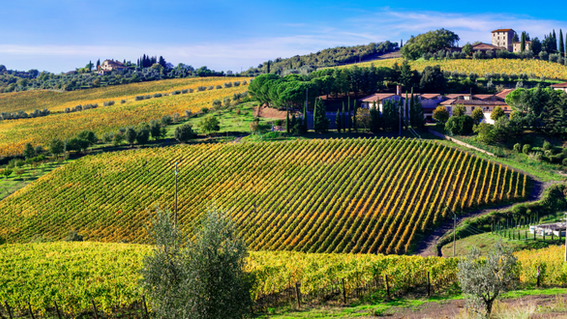
Fattoria Rodano
Toscana

About the Winery
Fattoria di Rodano is located in the heart of the Chianti Classico in the famed region of Castellina in Chianti. The original farm dates to the Middle Ages and sits on the historic Via Franchigena used by pilgrims to travel from northern Europe to Rome. It became a wine-producing property in the sixteenth century. The winery has been in the Pozzesi family for three generations, since 1958. Vittorio Pozzesi, who owned the winery until his passing in 2012, was the President of the Chianti Classico Consortium. His son, Enrico is now the winemaker and managing partner of the winery. Rodano's former winemaker was Guilio Gambelli, one of the most legendary winemakers in Chianti, consulting for such estates as Montevertine and Gianfranco Soldera.
Toscana
Tuscany is a predominantly hilly region with vineyard elevations rising up to 550 meters above sea level. About a quarter of the landscape is mountainous and a scant 8 percent is officially classified as flat. Approximately 57,942 hectares of the region's nearly 23,000 square kilometers is under vine. The main wine-growing areas of Tuscany include: Chianti, Montalcino, Montepulciano, The Tuscan coast Sangiovese grapes thrive in the interior hillside vineyards in the Chianti zone that runs between Florence and Siena, as well as in the Montalcino and Montepulciano areas, where its best expressions evolve. Cabernet Sauvignon flourishes in the warmer areas along the Tuscan coast. Soils in Tuscany range from soft and crumbly, marl-like clay-limestone and dense sandstone in the Apennine foothills to sandy clay around San Gimignano and gravelly clay and sandy soils in the Bolgheri and Maremma areas. Tuscany's climate is Mediterranean with dry, hot summers; warm springs; and mild, rainy autumns and winters. Variations in altitude, exposition, and diurnal temperatures in the foothills contribute to climatic conditions that help balance the sugar, acidity, and aromatics in the grapes, primarily Sangiovese planted there. Coastal areas like Bolgheri and Val di Cornia tend to be more temperate. source: SevenFifty Daily

Vineyard(s)
Ratings & Reviews
Title | Item | Vintage | Publication | Score | Review |
|---|---|---|---|---|---|
Fattoria Rodano | Poggialupi 2022 | 2022 | 89 | On the nose, savory aromas of coffee, tar and sage stand in pleasing contrast to the richness of brown butter and the subtle astringency of cherries and plums. The bright, crunchy palate runs with that astringency, before tightly wound tannins march toward a hot, acidic finish. | |
Fattoria Rodano | Poggialupi 2022 | 2022 | 90 | The 2022 Poggialupi is a soft, mid-weight wine to drink now and over the next handful of years. Crushed flowers, sweet red cherry fruit, tobacco, spice, cedar and earthy notes all grace this understated, classy Sangiovese. | |
Fattoria Rodano | Cabernet Sauvignon 'Mon Nene' 2021 | 2021 | 93 | The 2021 Mon Nenè (100% Cabernet Sauvignon) brings together so many of the qualities that make the best Rodáno wines incredibly appealing. Dark cherry fruit, grilled herbs, menthol, licorice, sage, tobacco, graphite and cured meats all run through this deep, potent wine. | |
Fattoria Rodano | Cabernet Sauvignon 'Mon Nene' 2021 | 2021 | 89 | The nose is a walk in the woods, over damp soil and through brambles, bushes and fields of flowers. On the palate, that gentle interplay between earth, herbs and berries glows beneath fizzy acid. |













